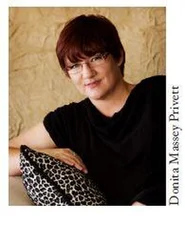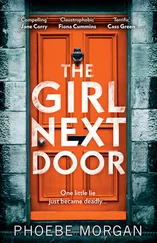Michael’s legs felt as if they wouldn’t move. They were heavy, as if made of stone. His father growled, ‘I said pass me that glass of water. Come on, look sharp. I don’t want to have to ask the lady, do I?’
Michael managed to lift himself on to his feet, felt he would overbalance but didn’t. Swaying a little, he made his way to the table, picked up the glass and carried it to his father. John Winwood’s eyes were on him, an unflinching stare. Michael turned away, sat down again, but instead of looking once more at his father, turned his eyes down to his hands, which lay in his lap. The room was silent, and then Caroline made a sound, a little gasp. Michael looked up. His father was drinking water out of the glass, not only drinking it but swallowing something.
‘Lock the door,’ John Winwood said. He had a small bottle in his hand.
Michael said, ‘I don’t . . . I can’t . . .’
‘Too late. It’s too late now.’
The bottle dropped out of his father’s hand, fell on to the carpet and rolled an inch or two. The almost hundred-year-old man slumped over the arm of his chair, his face contorted. He began to choke, a dreadful rasping yet liquid sound. Caroline jumped to her feet. Michael flung open the door and cried out, ‘Is anyone there? Come here. We need help.’
Darren came quickly, then Imogen, then a man Michael had never seen before. It had all taken five minutes and it was too late now. The man, who was a doctor said, ‘What did he take?’
‘He told me it was cyanide. He had it with him when he came to live here. I didn’t believe him. I should have believed him.’
The doctor asked Imogen to take Michael and Caroline Inshaw downstairs. He would come to them in ten minutes. They were shown into the austere pale grey room. Neither of them said a word but sat down in silence and waited.
The doctor came in a little before the ten minutes were up. Michael liked him better than Stefani. ‘The autopsy will show,’ said the doctor, ‘but what he took was aspirin. Death from cyanide would look quite different.’ He sighed and shook his head. ‘It was probably a heart attack.’
‘So it had nothing to do with the pill he swallowed?’ Caroline Inshaw sounded disappointed but was very likely only shocked.
‘Nothing,’ said the doctor. ‘It wasn’t the first heart attack he’d had but it was the last.’
Michael said, ‘He thought he’d had a heart murmur since he was young,’ but no one took any notice.
Though very ill and not expected to live, Norman Batchelor had survived, seemed very well and came to see his brother Stanley, because it was now he whose life was likely at an end. He had pancreatic cancer and there was very little could be done for him. Stanley often spent the day in bed, and he was in bed with Spot lying beside him when Norman arrived. John Winwood’s death was announced in a tiny item in the newspaper because he was only a few days short of a hundred. Stanley saw it in the Mirror but Helen had read it first and Norman told him all over again.
Norman ate heartily of Helen’s cooking. He had thought that Stanley would have passed away before 5 January, when he had a seat booked back to France on the Eurostar, but things had worked out differently. He was sitting on Stanley’s bed, though he had been asked by both Stanley and Helen not to do so, and when he got to his feet to fetch himself a cup of tea, he was assailed by the worst pain he had ever known. Clasping his left arm with his right hand, he was doubled up by pain. His legs gave way, he groaned and fell to the floor. Spot barked and ran downstairs, Helen came running up, but nothing could be done. It was another instance of too-lateness. Norman was dead. Stanley swore later that the last thing he said before he died was that he had been born on the kitchen table.
When it got to Twelfth Night or some such time-honoured day soon after Christmas, Lewis told Melissa that he must go home. Everyone else had left and he should go too. ‘Why?’ said Melissa. ‘No need to go unless you’ve something important to do at home.’
‘Well, I haven’t. No, I haven’t.’
He stayed. That night he moved from the bedroom he had been sleeping in since Christmas Eve to her bedroom. In March, Noreen Leopold phoned and he was told to invite her to Chiswick. Noreen, who was a quiet, rather sentimental woman, told them they were so romantic, it went straight to her heart. She told Lewis that James Rayment had been turned down by Anita Winwood. Lewis would have liked to know if his uncle had had a proper love affair with Anita, but Noreen was the kind of woman who would have been considered very old-fashioned if she had been living in London, and said when he asked that she wouldn’t know about things like that. He was her father, he wouldn’t have mentioned something like that to her. He did say he was glad she had refused to go off with him because if she had he’d never have met the very sweet lady who became their mother.
Noreen referred to James as an engineer. More like a motor mechanic, Lewis thought. Still, he’d done well, started his own business and reared a flourishing family. ‘He often talked about you,’ said Noreen. ‘Said you were the only one of his British relations he missed.’
Lewis thought that was a bit mean considering James had had a room in his parents’ house for months in 1944 and used it – he was thinking of the goings-on in the air-raid shelter – in a way you couldn’t use a hotel in those days, all rent-free. Still, he liked Noreen and once she was safely back in her Tottenham Court Road hotel, he and Melissa took her about to see all sorts of sights: the Tower of London, the National Gallery, Madame Tussaud’s – they were the oldest people there – Harrods (twice) and first class on the train to Brighton. After that, Noreen went on a five-day tour to Cornwall and Lewis and Melissa got married.
Stanley Batchelor died in St Margaret’s Hospital seven days after his brother Norman. ‘That makes two more widows,’ said Maureen briskly. She wasn’t sorry to find a sister-in-law sharing her plight. The family survivors all met at Stanley’s funeral. Old people attend funerals far more than younger ones. You would suppose that such rituals would be too near the bone for the elderly, but it appears not to be so. Perhaps they go because funerals are so personal to them. They have experienced many of them, they know all about the way these things go. There are no surprises.
As well as Maureen and Helen, Lewis was also at Stanley’s funeral, with his new wife Melissa. Everybody stared at her and pretended to be looking at some piece of decoration on the walls of St Mary’s. The men’s verdict was that old Lewis had done well for himself and the women’s that Melissa had had at least one facelift. Michael turned up, a rather unexpected guest. His father had died in his care home and in Michael’s presence, everyone knew that, and to some people his appearance seemed in bad taste. How did he know about the funeral? No one found out. The answer was that Maureen had phoned and told him. Daphne didn’t attend. Alan would very likely be there and it might be awkward for both of them to meet on such an occasion.
Alan did go, hoping to see Rosemary there. Daphne had sent his other suitcase some weeks before, and in it was his charcoal-coloured almost new suit which he meant to wear. In the time he had lived alone, his feelings for Rosemary had changed. He longed to return to the flat in Traps Hill. He longed for her. Many aspects of her recurred, coming to him in the night, in dreams, and in the daytime when he was out food shopping or sitting alone in the studio flat he was renting. The sound of her sewing machine, the sight of some new dress she had made, her always slightly wrong fish pie returned to him. Rosemary was not at the funeral, and it troubled Alan that most of those who attended and knew him asked after her. Was she unwell? Didn’t they know that he and she had been apart for months? He replied non-committally and went home before anyone could carry him off to the graveside.
Читать дальше












